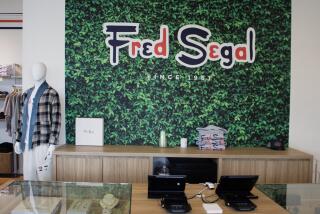True Religion board accepts $835-million takeover bid
- Share via
True Religion Apparel Inc., the Southern California purveyor of pricey designer denim, may have gotten too small for its britches.
More than half a year after putting itself up for sale amid growth struggles and fluctuating stock, the high-end-jeans seller said its board unanimously accepted an $835-million takeover offer from investment firm TowerBrook Capital Partners.
The $32-a-share deal for the Vernon label represents an 8.7% premium on Thursday’s $29.44-a-share closing price and a 52% increase from the stock price Oct. 9, the day before True Religion said it would explore strategic alternatives.
Just past its 10-year anniversary, the upscale brand is grappling with heavy competition and changing consumer perception of its once elite reputation.
Founded in 2002 by Jeff Lubell, the apparel maker sells jeans in boutiques and department stores as well as in 124 eponymous U.S. stores and 31 international locations.
On the company’s website, a pair of ripped women’s jeans goes for nearly $300. At one time, style-savvy shoppers would have eagerly snatched up similar pants, having seen other True Religion designs gracing the A-list legs of Beyonce, Britney Spears and Halle Berry.
But even as True Religion was scaling the celebrity ranks, so too were competitors such as the Buckle Inc. and, to a less luxurious extent, Lucky Brand Jeans. Several rivals battled for premium denim turf in True Religion’s backyard: Citizens of Humanity is based in Huntington Park, Joe’s Jeans is in Commerce and 7 for All Mankind is in Los Angeles.
Then the recession hit, making the prospect of three-figure prices for jeans increasingly unappetizing for cash-crunched consumers. Even after the economy began to improve and premium denim sales began rebounding, women became more discerning in their purchases, according to analyst Marshal Cohen with NPD Group.
“Women said that unless these denim brands come up with something that is uniquely different, that is going to make my butt look even better than the pair I already have, I’m not spending $100-plus on a new pair so quickly,” Cohen said. “They’re looking for new, exciting, innovative products.”
That desire has caused a shift in the upscale-denim market.
The thrill of discovering regional, underground brands — there are more than 100 in Los Angeles alone, according to Cohen — became more important than patronizing older and more established labels. On social media, some fashionistas have begun disparaging True Religion and its ilk as an exaggerated display of excess wealth.
“These big, premium denim brands — what was once considered to be a truly boutique and high-end name — became more commercialized, and the momentum became harder to maintain,” Cohen said.
The market for jeans $75 and more rose 10.8% between April 2012 and March this year, pulling in $1.4 billion in revenue over the period, according to NPD.
Part of the recovery is due to companies lowering their average prices and offering cheaper alternatives, said Motley Fool analyst Andrew Marder.
Brands such as True Religion began focusing on their non-denim products, such as sportswear. Items other than jeans now make up more than 30% of True Religion’s sales.
And companies such as Guess, whose revenue in China has surged 75% in two years, have started looking abroad for customers.
“Success has been mixed, and challenges from other retailers — like Gap, which has refocused attention on its 1969 line of jeans — continue to make this a very difficult space for retailers to succeed in,” Marder said.
True Religion’s competitors appear to have convinced Wall Street that they have adapted to the new market. In the last year, Joe’s stock has risen nearly 40%. The Buckle’s has surged more than 33%.
True Religion, however, has seen a smaller, 13% boost. True Religion closed Friday at $31.82, up $2.38, or 8.1%.
Lubell stepped down as chief executive, chairman and creative director of the company in March, two weeks after learning that his contract would not be renewed. He moved into a role as chairman emeritus and creative consultant.
The arrangement with TowerBrook, which is based in New York and London, is expected to close in the third quarter if True Religion shareholders sign off. On Friday, True Religion shares were halted in morning trading in New York after closing up 3.2% the day before.
On the same day, the company said it brought in $120.8 million in revenue in its first quarter, a 13.1% boost from the same period a year earlier. But net income slumped to $526,000, or 2 cents a share, from $10.4 million, or 41 cents a share.
Even excluding what the company called “separation costs” with Lubell and the effect of its review of strategic alternatives, profits still tanked to $5.7 million, or 22 cents a share.
Irvine resident Allyson Manaois, 34, has been buying True Religion jeans for nearly four years and owns several pairs, having been converted from the Levi’s of her youth by a “transformative” experience in a Bloomingdale’s.
But the technical writer is terrified that the sale of the company will debase the brand, pointing to the fate of denim label Rock & Republic, which was founded around the same time as True Religion but went bankrupt in 2010.
A budget version of the Rock & Republic brand is now sold at Kohl’s stores.
“Any time there’s a major change like this, I just worry about how it will affect the quality,” she said. “I really do adore them, and I just hope that they’ll continue to be a premium brand, but I also know they’re not the only brand out there.”
More to Read
Inside the business of entertainment
The Wide Shot brings you news, analysis and insights on everything from streaming wars to production — and what it all means for the future.
You may occasionally receive promotional content from the Los Angeles Times.











